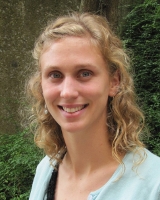2011 REU and REV Program Participant Profiles: Krista Schaefer
 |
Major: Mathematics |
What is the purpose of your research?
My research is looking at the early infection dynamics of simian immunodeficiency virus (SIV), which is much like HIV, but in monkeys. We have created differential equations that correspond to the changes a cell can go through as it becomes infected. With the equations, we run many simulations with different parameters, and we are analyzing the time to infection. From our research, we would like to fit our model to actual experimental data to suggest whether the origin of HIV is a free virus or an infected cell.
What does your research ultimately accomplish?
Our research of the acute stage of infection has not been a focus of many studies. We are creating a biologically-sound model with which we are analyzing transmission rates and times to infection. Both of those quantities have been analyzed experimentally with SIV, and we are fitting our model to the experimental data points.
With a good fit, we will suggest the best parameters for the infection, and we will support either a free virus or an infected cell as the cause of HIV infection.
![]()
Outside of researching, I love being in this area for the summer because each weekend we explore the Smoky Mountains, tube down rivers, go whitewater canoeing, or find some other adventure.
![]()
– Krista Schaefer, REU participant
Describe a typical day on the job:
My group of four students meets and works together every day, Monday through Friday. We start around 9:30 am and work until about 5:00 pm, with breaks for food, random thoughts, and coffee. Throughout the day, we are writing code in R, using Maple, doing spatial arrangements in NetLogo, reading scientific papers, and continually writing new drafts of our report. While the project seems like a lot to do, each day we focus on different tasks that we are assigned once or twice a week at meetings with our mentors.
Do you have a personal side to your research you would like to share?
We took a field trip to Emory University, where they have a nationally credited primate research lab. We got a tour of all the equipment they use, met with the director, and got to see some monkeys during a social behavior study and other monkeys with vaccinations for SIV.
What were your favorite parts of the REU/REV program?
I really enjoyed working in collaboration with the other students on my project and getting to work with great mentors in mathematics and microbiology. The collaboration has been wonderful because each of us has knowledge in mathematics and biology, but we also have specific topics that we are the strongest in. Contributing something to the group and then learning from other students has helped our research progress.
What do you do outside of work?
Outside of researching, I love being in this area for the summer because each weekend we explore the Smoky Mountains, tube down rivers, go whitewater canoeing, or find some other adventure. I also have taken advantage of the free gym membership, which allows me to take free classes, use the gym, pool and rock wall, and do day trips with the UTK outdoor program.
What new experiences did you gain that have helped you today?
I have gained the confidence to work collaboratively with my mentors, which allowed me to get to know them on a personal level too so that we could discuss my interests for the future and different programs and schools I can look into for graduate school.
What advice would you give someone who's interested in/curious about participating in the program?
Read the proposals about each project to find the ones that interest you, and then look up the professors that are mentoring that group and read about their research. It is really helpful to know some math programs or languages for this program. But, I only have a vague knowledge of R and Maple, and with some guidance and a lot of Google searches, anybody would be able to do most of the programming needed!
NIMBioS
1122 Volunteer Blvd., Suite 106
University of Tennessee
Knoxville,
TN 37996-3410
PH: (865) 974-9334
FAX: (865) 974-9461
Contact NIMBioS


